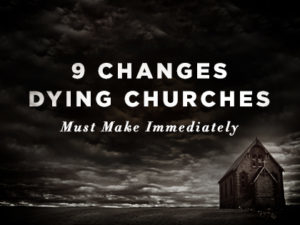We thank Thom Rainer for giving us permission to repost his article. Thom S. Rainer serves as president and CEO of LifeWay Christian Resources. Dr. Rainer can be found on Twitter (@ThomRainer) and at Facebook.com/Thom.S.Rainer. This article was originally published at ThomRainer.com on March 27, 2017.
It broke my heart.
Another church closed. This church had unbelievable potential. Indeed, it had its own “glory days,” but only for a season. But, 10 years ago, few would have predicted this church’s closure. Today, it is but another statistic in the ecclesiastical graveyard.
I know. We don’t compromise doctrine. I know. We must never say we will change God’s Word.
But many of our congregations must change. They must change or they will die. I call these churches “the urgent church.” Time is of the essence. If changes do not happen soon—very soon—these churches will die. The pace of congregational death is accelerating.
What, then, are some of the key changes churches must make? Allow me to give you a fair warning: None of them are easy. Indeed, they are only possible in God’s power. Here are nine of them.
1. We must stop bemoaning the death of cultural Christianity.
Such whining does us no good. Easy growth is simply not a reality for many churches. People no longer come to a church because they believe they must do so to be culturally accepted. The next time a church member says, “They know where we are; they can come here if they want to,” rebuke him. Great Commission Christianity is about going; it’s not “y’all come.”
2. We must cease seeing the church as a place of comfort and stability in the midst of rapid change.
Certainly, God’s truth is unchanging. So we do find comfort and stability in that reality. But don’t look to your church not to change methods, approaches and human-made traditions. Indeed, we must learn to be uncomfortable in the world if we are to make a difference. “We’ve never done it that way before” is a death declaration.
3. We must abandon the entitlement mentality.
Your church is not a country club where you pay dues to get your perks and privileges. It is a gospel outpost where you are to put yourself last. Don’t seek to get your way with the music, temperature and length of sermons. Here is a simple guideline: Be willing to die for the sake of the gospel. That’s the opposite of the entitlement mentality.
4. We must start doing.
Most of us like the idea of evangelism more than we like doing evangelism. Try a simple prayer and ask God to give you gospel opportunities. You may be surprised how he will use you.
5. We must stop using biblical words in unbiblical ways.
“Discipleship” does not mean caretaking. “Fellowship” does not mean entertainment.
6. We must stop focusing on minor issues.
Satan must delight when a church spends six months wrangling over a bylaw change. That’s six months of gospel negligence.
7. We must stop shooting our own.
This tragedy is related to the entitlement mentality. If we don’t get our way, we will go after the pastor, the staff member or the church member who has a different perspective than our own. We will even go after their families. Don’t let bullies and perpetual critics control the church. Don’t shoot our own. It’s not friendly fire.
8. We must stop wasting time in unproductive meetings, committees and business sessions.
Wouldn’t it be nice if every church member could only ask one question or make one comment in a meeting for every time he or she has shared his or her faith the past week?
9. We must become houses of prayer.
Stated simply, we are doing too much in our own power. We are really busy, but we are not doing the business of God.
Around 200 churches will close this week, maybe more. The pace will accelerate unless our congregations make some dramatic changes. The need is urgent.
Hear me well, church leaders and church members. For many of your churches the choice is simple: Change or die.
Time is running out. Please, for the sake of the gospel, forsake yourself and make the changes in God’s power.

